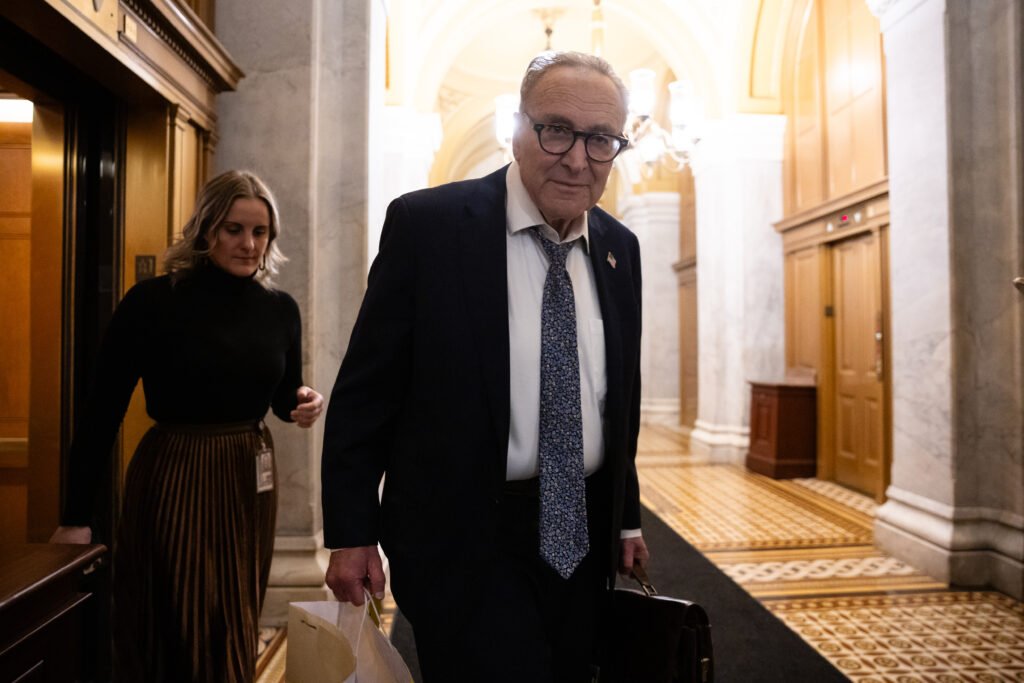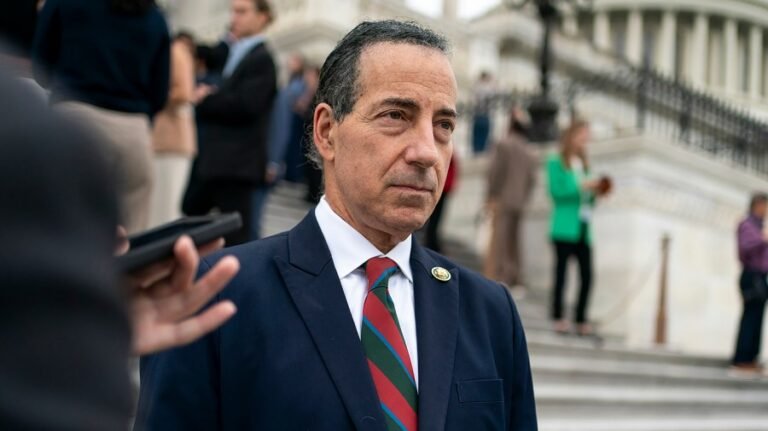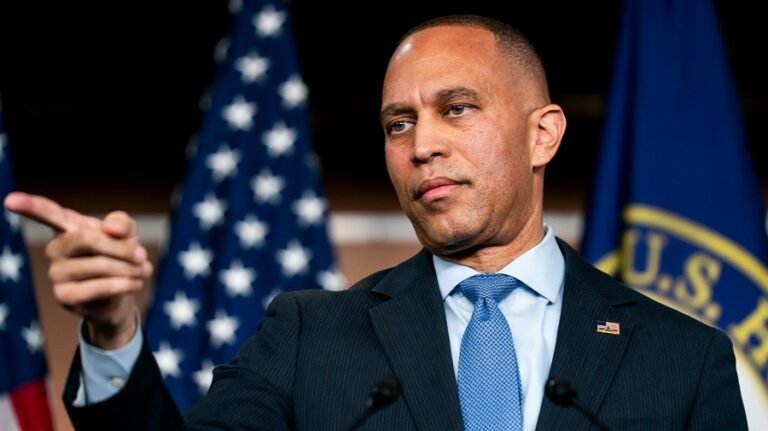
Senate Minority Leader Chuck Schumer is the target of liberal fury for a second time this year. His Democratic colleagues aren’t joining the pile-on.
The New York Democrat is facing calls to resign from his leadership post from a coalition of progressive outside groups, House Democrats and even some Senate hopefuls over the chamber’s approval of a bipartisan shutdown deal that he didn’t even vote for.
That’s a U-turn from March, when he assumed responsibility for helping advance a GOP-written government funding stopgap that sparked weeks of intense criticism and calls for his ouster from Democrats outside the Senate. This time, Schumer joined with most of the caucus to blast the agreement for not meeting Democrats’ top demand — an extension of expiring Affordable Care Act subsidies.
Outside the Senate, that’s a distinction without a difference to Schumer’s critics, who believe he should have done more to stop eight Democratic caucus members from defecting. Inside the Senate, views are more nuanced.
“Chuck didn’t want this to happen. And I sat with him in rooms as he tried to stop this from occurring. This has got to be a caucus-wide conversation,” said Sen. Chris Murphy (D-Conn.), a fierce critic of the deal. “Because if this is really how 10 or 15 members are going to regularly conduct business, it’s hard for any leader to stop that from happening.”
The liberal pushback comes as Schumer, 74, faces larger questions about his long-term political future. Progressives are dreaming of a 2028 primary challenge, and he has repeatedly declined to say whether or not he will run for a sixth Senate term.
Instead, Schumer insists he’s keeping his focus on the 2026 midterm elections — and a chance of once again becoming majority leader.
While many Senate Democrats expressed frustration with the outcome of the shutdown fight, there is no appetite for an immediate Schumer ouster, according to five people granted anonymity to discuss internal caucus dynamics.
Schumer isn’t up for reelection as leader until after the 2026 midterms that he is expected to try to make a referendum on Trump and health care. He indicated earlier this year that he intends to run for the post again. So far, no one is chomping at the bit to challenge him nor is there a consensus on who, if anyone, could — though there’s also no real incentive for a challenger to emerge more than a year in advance.
“You can argue and I can make the case that Chuck Schumer has done a lot of bad things, but I think getting rid of him — who’s going to replace him?” Sen. Bernie Sanders (I-Vt.) told MSNBC’s Rachel Maddow, adding that he views Schumer and most of the Senate Democratic Caucus as part of the “establishment.”
Schumer is brushing off the latest wave of criticism from the left flank of his party, believing it comes with the job of being the leader.
He’s hardly the first Senate leader to get flak from his party. Sen. Mitch McConnell (R-Ky.), the longtime Republican leader, faced frequent and withering criticism from conservative critics but remained in the top spot for years — even defeating a challenger in 2022.
One thing the two have in common: Schumer and McConnell both spent time leading their party’s campaign committees and kept close control of political operations as leaders — meaning they played a key role in electing many of the lawmakers who in turn vote on leadership races. Schumer has recruited several big names to run this year, though some primary candidates he is not backing have already called for him to resign.
After the March funding fight, Schumer made a concerted effort to prevent another crack-up ahead of the Sept. 30 shutdown deadline. He kept in close touch with House Minority Leader Hakeem Jeffries, and they together strategized around making health care the centerpiece of their messaging.
The two leaders were not in perfect harmony during the six-week shutdown, but they mostly sang from the same songsheet. Jeffries gave his fellow Brooklynite a quick gesture of confidence after the Senate moved forward with the deal this week.
“Yes and yes,” he said, when asked if Schumer was effective as Senate minority leader and should keep his job. He went on to praise Schumer’s “valiant fight on behalf of the American people.”
In March, he responded to a similar query with, “Next question.”
But the progressive anger at Schumer is centered around a belief that he didn’t do enough to hold his members together to try to force concessions from Republicans on health care.
“The most generous case for Schumer is to believe him — that he and 39 other members of his caucus … all believed that one thing was the correct strategy and that he was able to get undermined by eight outliers. Well, what does that say about his leadership?” Progressive Change Campaign Committee co-founder Adam Green said Tuesday.
“We’ve worked very closely with his office, we did not call for him to step down in March when others like Indivisible did, but on many fronts after this saga it’s clear there is a failure of leadership and there needs to be a change,” he added.
Schumer has acknowledged he encouraged members of his caucus to talk with Republicans in the early weeks of the shutdown. But behind the scenes, he privately told the negotiators he couldn’t support the agreement they were envisioning and privately urged them to hold out to try to get more concessions, according to a person granted anonymity to discuss the negotiations.
A core group of Democratic negotiators, however, believed no further concessions were going to happen no matter how long their caucus held out — and they were able to convince enough of their colleagues of that over the past week. Big victories in this month’s off-year elections delayed but did not destroy that conclusion.
“I know that there were number of my colleagues who thought that, well, we had this big victory on Tuesday, but that didn’t change the impact of the shutdown and I was convinced, as for the people who voted with me … that another day, another week, another month, was not going to make a difference,” said Sen. Jeanne Shaheen (D-N.H.).
Shaheen said Schumer did not try to dissuade her but would not say if he was supportive of her efforts. Sen. Tim Kaine (D-Va.) said Schumer was “informed” but “he definitely did not bless it.” Schumer’s No. 2, Sen. Dick Durbin (D-Ill.), told reporters that Schumer gave the eight who voted for the deal neither a “blessing or a curse.”
Schumer “handled this well,” Durbin added. “It was a hard assignment.”
In addition to keeping tabs on the negotiators, Schumer met regularly with members of the progressive wing of his caucus. Privately, he made the case that Democrats were winning the shutdown fight and that cracks were starting to emerge from Republicans, the person close to the negotiations added. He also convinced Democrats who privately wanted to vote to reopen the government weeks ago to hold out.
The progressive bloc, however, isn’t running to his defense. At the same time, its members aren’t openly criticizing him, preferring instead to sidestep questions about his leadership.
“I think Democrats need to continue the fight to lower families’ costs, and we need to be more effective in that fight,” Sen. Elizabeth Warren (D-Mass.) said when asked whether or not Schumer should remain leader.
Pressed if Schumer had been doing that, Warren said, “The Democrats did not hold the line.”
Sen. Chris Van Hollen (D-Md.) said Democrats “will have to figure out a better strategy going forward.” But he declined to discuss Schumer, adding that “I’m not going to get into all of that right now.”
Murphy said the underlying issues “would be difficult for any leader to manage.”
“We clearly have a repeating problem in our caucus, that the minority of members are reaching deals with Republicans,” he said. “That’s a problem that the whole caucus has to solve.”
Jennifer Scholtes and Katherine Tully-McManus contributed to this report.


